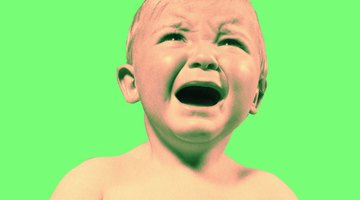Signs of Autism in a 4 Month Old Baby
Autism is a buzzword of the 21st century.
Diagnoses are on the rise: the Centers for Disease Control and Prevention currently places the numbers at approximately 1 in 110 children. Autism happens in all socioeconomic, ethnic and racial groups, but boys are more likely to suffer.
Autism Defined
It is difficult to define autism, as symptoms fall on a spectrum and vary among people. The American Academy of Pediatrics also includes Asperger syndrome, childhood disintegrative disorder, Rett syndrome and pervasive developmental disorder on the autism spectrum. Autistic children are generally challenged in the areas of communication and social skills.
Warning

Signs of Autism in 20 Month Old Baby
Learn More
Autism is difficult to diagnose before 18 months, according to the AAP, but some red flags in 4-month-old babies could indicate a future diagnosis. If parents suspect their child has autism, they should discuss symptoms with their pediatrician immediately. Early intervention always contributes to a better outcome. All children are screened for autism at their 18-month well checks.
Symptoms
Lack of communication is a primary indicator of autism. In a 4-month-old, this might look like a baby who fails to maintain eye contact or who does not respond to games of peek-a-boo.
By 4 months of age, most babies smile, coo and babble, but an autistic child will likely remain mute and expressionless. From an early age, babies turn their heads toward sounds and other stimuli, but autistic children might not.
Transitions are also exceptionally difficult for the autistic child.
While many babies dislike diaper changes and baths, they might leave an autistic 4-month-old inconsolable. Physical contact may also be a challenge. Most babies like to be snuggled and held or worn closely at 4 months of age, whereas an autistic baby generally shies away from any kind of touch.
Controversy

About Toddler Arm Flapping
Learn More
Doctors do not know what causes autism, but there are plenty of theories. The Autism Research Institute indicates that causes may be environmental, biological, dietary, related to the current CDC-mandated vaccination schedule or a combination of all four.
Treatment
Conventional doctors usually prescribe medication for autism, but as the Autism Research Institute indicates, that is not the only treatment available. The ARI advocates a biomedical treatment, which combines diet, supplements and behavioral therapy. The bottom line is that while there is no one cure for autism, symptoms can be significantly improved with careful, early attention.
Related Articles
- Centers for Disease Control & Prevention: Autism Spectrum Disorders
- Centers for Disease Control & Prevention: Autism Data & Statistics
- “Pediatrics”; Identification and Evaluation of Children With Autism Spectrum Disorders; Chris Plauché Johnson, Scott M. Myers and the Council on Children With Disabilities; Nov 2007











